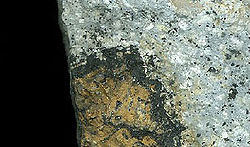Hypersthene: Difference between revisions
m robot Adding: nl:Hyperstheen |
Image, +sk, de |
||
| Line 1: | Line 1: | ||
[[Image:Mineraly.sk - hypersten.jpg|right|thumb|250px|A sample of hypersthene]] |
|||
'''Hypersthene''' is a common rock-forming [[Silicate minerals|inosilicate]] [[mineral]] belonging to the group of [[orthorhombic]] [[pyroxene]]s. The name has now been formally abandoned and [[enstatite|enstatite or ferrosilite]] is preferred. It is found in [[Igneous rock|igneous]] and some [[metamorphic rock]]s as well as in stony and iron [[meteorite]]s. It forms a solid solution series with the minerals enstatite and ferrosilite, being a mid-way member between the two, and for both of which it is often regarded as a synonym. The chemical formula is (Mg,Fe)Si0<sub>3</sub>. |
'''Hypersthene''' is a common rock-forming [[Silicate minerals|inosilicate]] [[mineral]] belonging to the group of [[orthorhombic]] [[pyroxene]]s. The name has now been formally abandoned and [[enstatite|enstatite or ferrosilite]] is preferred. It is found in [[Igneous rock|igneous]] and some [[metamorphic rock]]s as well as in stony and iron [[meteorite]]s. It forms a solid solution series with the minerals enstatite and ferrosilite, being a mid-way member between the two, and for both of which it is often regarded as a synonym. The chemical formula is (Mg,Fe)Si0<sub>3</sub>. |
||
| Line 17: | Line 18: | ||
{{1911}} |
{{1911}} |
||
[[de:Hypersthen]] |
|||
[[nl:Hyperstheen]] |
[[nl:Hyperstheen]] |
||
[[sk:hyperstén]] |
|||
Revision as of 18:10, 21 May 2006

Hypersthene is a common rock-forming inosilicate mineral belonging to the group of orthorhombic pyroxenes. The name has now been formally abandoned and enstatite or ferrosilite is preferred. It is found in igneous and some metamorphic rocks as well as in stony and iron meteorites. It forms a solid solution series with the minerals enstatite and ferrosilite, being a mid-way member between the two, and for both of which it is often regarded as a synonym. The chemical formula is (Mg,Fe)Si03.
Distinctly developed crystals are rare, the mineral being usually found as foliated masses embedded in the igneous rocks norite and hypersthene-andesite, of which it forms an essential constituent. The coarse-grained labradorite-hypersthene-rock (norite) of the island of Paul off the coast of Labrador has furnished the most typical material; and for this reason the mineral has been known as Labrador hornblende or paulite.
Color is often gray, brown or green, and the luster is usually vitreous to pearly. The pleochroism is strong, the hardness is 5 - 6, and the specific gravity is 3.4 - 3.9. On certain surfaces it displays a brilliant copper-red metallic sheen, or schiller, which has the same origin as the bronzy sheen of bronzite, but is even more pronounced. Like bronzite, it is sometimes cut and polished as a gemstone.
The name hypersthene comes from the Greek and means "over strength". It is in allusion to its greater hardness than the amphibole mineral hornblende, a mineral with which it is often confused.
References
This article incorporates text from a publication now in the public domain: Chisholm, Hugh, ed. (1911). Encyclopædia Britannica (11th ed.). Cambridge University Press. {{cite encyclopedia}}: Missing or empty |title= (help)
